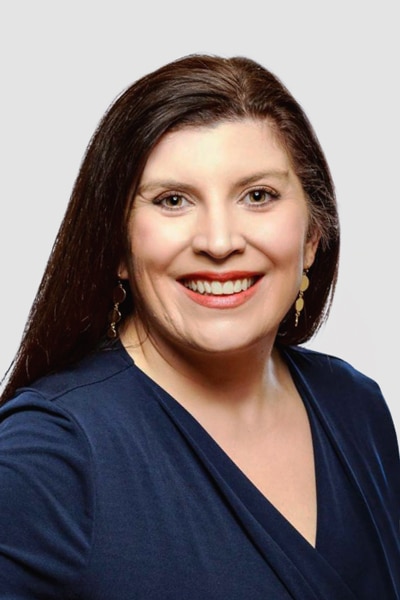The past couple of years have been an extraordinary period for Courtney Nelson (formerly Courtney Hanfland), system director of real estate transactions and portfolio strategy with CommonSpirit Health. She supported real estate portion of a healthcare megamerger of Catholic Health Initiatives (CHI) and Dignity Health that resulted in CommonSpirit, a combined organization with 142 hospitals in 21 states and has since been a key executive in the integration of the real estate team.

During the process, partners like Physicians Realty Trust noticed and were impressed with Nelson’s in-depth knowledge of the market trends, the portfolio details, and her desire to find a trusted real estate partner committed to a long-term relationship. “Courtney has long been recognized as a bold leader in both the healthcare real estate industry and CHI (now known as CommonSpirit Health),” shares John Thomas, president and CEO of Physicians Realty Trust. “She personifies a relationship-first approach while displaying finesse in navigating complex, multilayered transactions with ease.”
That transaction was finalized in early 2019. About a year later, the COVID-19 pandemic struck the US, causing reevaluation of how healthcare is conducted and how space is used. Nelson and the real estate specialists that she leads were already immersed in a wholesale review of CommonSpirit’s vast real estate holdings, looking for ways to better use space and trim costs. The pandemic’s impact altered the calculus, adding further opportunities for real estate budget savings.
The one-two punch of a huge merger and a highly transmissible, deadly disease were heaped on trends such as changes in insurance reimbursement and new technologies—both impacting space utilization. These factors illustrate the unprecedented uncertainty and rapid change buffeting healthcare real estate strategies.
“The challenges we are working on today I could have never predicted even two years ago,” Nelson says. Rarely, if ever, has the real estate function been poised to be so impactful to the organization’s mission. With oversight of all real estate transactions for the health system— buying, selling, leasing, development, creative financing, and portfolio strategy—Nelson is spearheading a new approach to real estate.
Leading into the merger, both CHI and Dignity had recognized under-utilized space and non-strategic space that could be trimmed. “We had identified millions of dollars in savings opportunities,” Nelson says. “Post-COVID, we can be even more aggressive on reducing administrative space.” Savings could total millions of dollars annually.
With nearly all administrative staff working from home for several months during the pandemic, executives found that employees were able to perform their jobs satisfactorily or even better than they did in the office. Early indications show the virtual work experiment, forced by the virus, has been such a success that CommonSpirit fully intends to continue to evaluate and expand telecommuting across the enterprise.
“Decisions we make over the next six to twelve months will last five to ten years and we must be able to quickly adapt the physical environment to meet the rapidly changing needs of our business.”
“It’s too early to predict exactly how it will shake out,” Nelson says. But, it’s possible that CommonSpirit will end up cutting as much as half of the space it currently leases for administrative personnel.
As CommonSpirit physicians prepared to resume a more regular schedule of in-person patient visits, CommonSpirit continues to assess how to translate CDC rules on preventing COVID-19 transmission into policies for using space. “We are looking at what is the appropriate size of exam rooms and how many practitioners should use each one,” Nelson says. Also, waiting rooms may be reconfigured to support social distancing and the need for space as the utilization of telemedicine continues to expand.
During and after COVID-19, flexibility will be prized when designing new space and remodeling existing space, Nelson says. Exam rooms that can be converted to offices, and offices that can be converted to exam rooms, for example, will make it easier to adjust to telemedicine trends.
Nelson says there is no doubt the overall real estate utilized by the healthcare system will continue to change, but it will take more time to make decisions on how and where to do that. Thus, when negotiating leases, Nelson is pushing for clauses that allow for contraction and expansion options, and rights of first refusal to purchase. She also strives to pre-negotiate with landlords how capital upgrades would be funded if expansion is needed. “Decisions we make over the next six to twelve months will last five to ten years and we must be able to quickly adapt the physical environment to meet the rapidly changing needs of our business,” she notes.
Nelson and her team are closely examining expiring leases. With the economic downturn caused by the pandemic, rents will likely decline and there will be many opportunities to secure better rates from landlords. Commercial rents are likely to drop across the board, with retail being particularly hard hit. There may be areas where empty strip mall storefronts would make attractive space for urgent care and medical practice facilities, for instance.
In the hospital arena, the pandemic has led to reevaluation of certain shared staff spaces, such as break rooms, which may be venues for virus transmission. Eliminating those might provide for extra surge capacity as well as keep staff safer. Adding more nurse workstations might be necessary so that nurses would have fewer shared points of contact that could lead to disease transmission.
“There are a lot of practices that have been in place for fifty years or more that COVID has forced us to do an about face on,” Nelson says. On the heels of a giant merger, this unforeseen pandemic added plenty of uncertainty over the effort to cut real estate costs. These are the most challenging circumstances that Nelson has experienced in her career. Nonetheless, she is excited about the opportunities to save millions of dollars that will aid CommonSpirit’s mission that includes healthcare for the most vulnerable in society.
“I am very grateful to work for a faith-based organization with strong values,” she says. “Everybody is on the same path.”
For twenty years, HealthCare Appraisers has been a pioneer in the field of healthcare valuation and advisory services, including business valuation, compensation valuation, real estate, capital assets, and executive compensation and governance. With eight offices and more than one hundred dedicated team members, HealthCare Appraisers works with clients in all fifty states and abroad.


